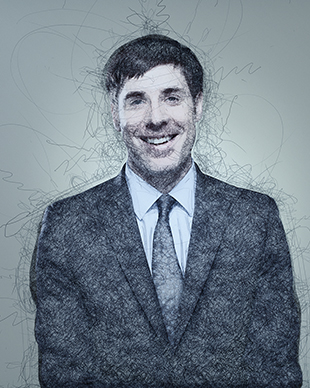IN Play: Q&A With Sean Kruskol, CPA, CGMA, CFE
From Chicago to Europe and back again, this CPA's credentials have led him along an “unconventional” career path.
By Sarah Herrmann | Winter 2018

From Chicago to Europe and back again, Sean
Kruskol’s CPA, CGMA, and CFE credentials have led
him along what he calls an “unconventional” career
path. With stints in the Big Four, start-ups, and various
consulting firms, he’s moved between audit, data
analytics, and forensic roles. As a member of the
Illinois CPA Society’s Audit & Assurance Services
Committee, he’s also at the forefront of shaping
guidance for an ever-evolving profession. Add in his
volunteer efforts and it’s no wonder that 33-year-old
Kruskol is already a rising influencer in the profession.
Q: Tell us a little about your career path and current role.
Like many accounting grads, I started my career at KPMG in Chicago in the firm’s audit
practice after graduating from Ohio’s Miami University. But after a rotation with KPMG
Forensic, I was hooked on data analytics and became a Computer Assisted Audit
Technique expert. In this role, I assisted my teams with audits and was also able to travel
throughout Europe performing detailed, accelerated analyses.
After stops at a Chicago start-up and another consulting firm, I now work at Cornerstone
Research, an international economics and financial consulting firm, where I focus on
analysis and research in complex litigation, or simply put, forensic accounting. Every day
is different. I might be analyzing large datasets for a damages case and presenting findings
to attorneys. I could be examining documents in an auditor malpractice case. Or, I might
be interviewing witnesses in a fraud examination.
Q: What inspired you to part from traditional public accounting roles?
During an accounting class I took in college, a CFO, an audit partner, and a forensic
accountant each gave a short job talk. The CFO added value, she said, by acquiring other
companies and driving her company’s strategy. The audit partner did so by allowing his
clients access to capital markets and bolstering investors’ confidence in a company’s
financial statements. The forensic accountant said that he traveled around the world
investigating allegedly illegal activities. The idea of using my accounting degree to solve
challenging problems associated with investigations appealed to me right away, and I’ve
been fortunate to be able to do just that.
Q: You’ve landed on the Illinois CPA Society’s Audit & Assurance
Services Committee. How has that impacted your career?
Two points come to mind. First, I work with CPAs whose perspectives differ vastly from
my own, yet we share common goals. The level of respectful dissonance during our
committee and sub-committee meetings allows me to learn from people with whom I might
not otherwise interact professionally. Second, through the committee, I am close to the
forefront of guidance in an ever-evolving profession. I can remain current on new guidance
and assess possible litigation risks that might result.
Q: You even find time for volunteerism with other organizations.
Can you tell us about that?
I’ve been fortunate to apply my technical and financial expertise in a variety of volunteer
capacities. Of these, two examples stand out. First, I am currently treasurer of Illinois Legal
Aid Online (ILAO), a legal nonprofit in Chicago. ILAO is an online platform that connects
people in Illinois — regardless of their location, income, or education — to resources they
need to resolve their legal problems when they can't afford a lawyer.
Second, I serve on the advisory board of the Chicago Bar Foundation’s Justice
Entrepreneurs Project, a legal incubator for solo and small practitioners. Previously, I was
part of the Project’s initial budget committee, which sought to identify and assess expenses
associated with a legal incubator and fundraising target thresholds.
Q: What advice do you have for others hoping to make an impact
with their careers or get into forensic accounting?
If you want to make a difference, and if you want to pursue a fulfilling career path, my top
three pieces of advice would be:
1. Think about your “why.” You can be taught the “how” of being a forensic accountant,
for example, but your why will be the reason you wake up and go into the office.
2. Expand your mind. Forensic accounting is a capstone course, for which you need a
strong foundation in accounting, finance, marketing, and operations. And a diverse
skill set will serve you well in any career path you choose to follow.
3. Develop your data skills. The business world is increasingly digital and data-driven.
Become comfortable with a variety of platforms and software packages. Being good
with data means that you not only understand how and why data were created but also
the relations that exist within datasets and what may be missing or anomalous.